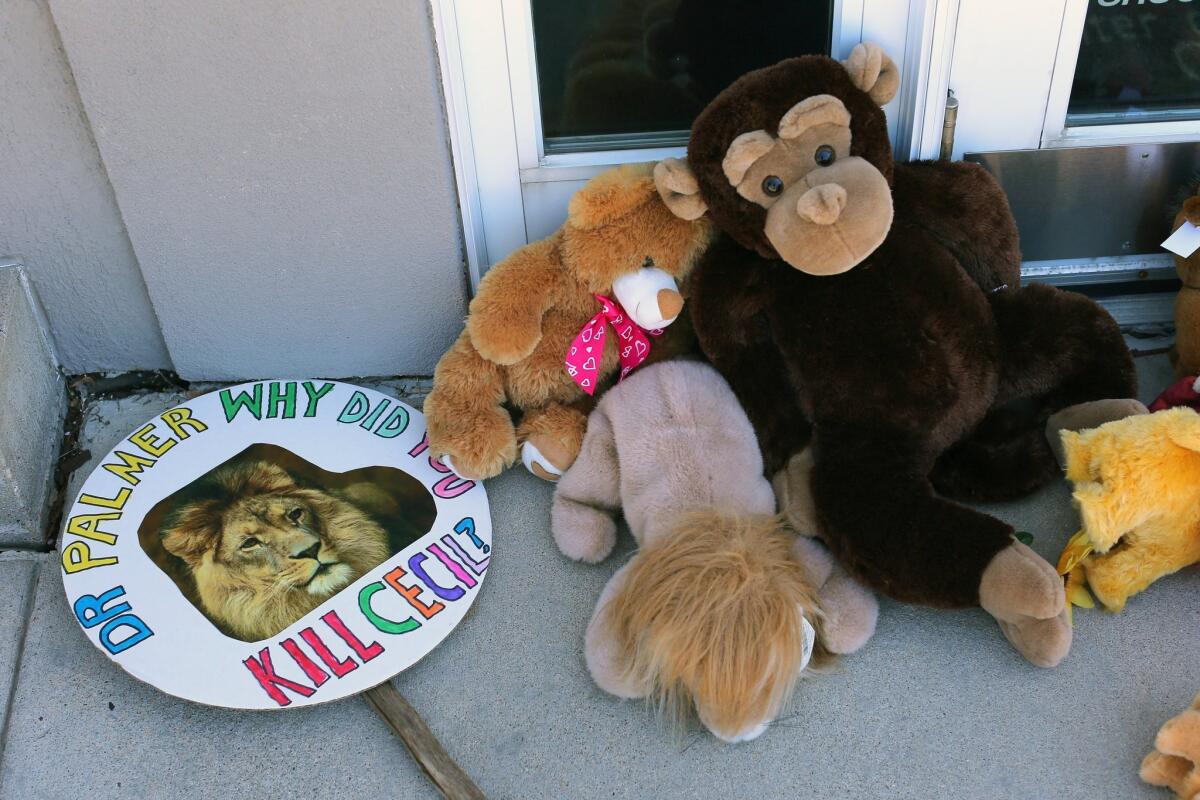Killing of Cecil the lion spotlights reports of corruption in southern Africa

Signs and toy animals are placed at a memorial for Cecil the lion in the parking lot of Dr. Walter Palmer’s dental clinic in Bloomington, Minn.
- Share via
Reporting from Johannesburg, South Africa — The illegal killing of a lion in Zimbabwe by a Minnesota dentist has focused attention on the elite hunting industry in southern Africa, which critics say is poorly policed and riddled with corruption.
With poaching of elephants and rhinos at a crisis point in the region, American Walter Palmer’s lion hunt -- using a bow and arrow -- created an Internet firestorm as angry criticism continued to pour in from around the globe.
Some threatened to boycott his dental business in Bloomington, Minn., where people placed toy animals outside the practice’s closed doors Wednesday.
A Minnesota congresswoman, Rep. Betty McCollum, said it was necessary to determine whether any U.S. laws were broken.
“For those of us committed to ending poaching of iconic African species I strongly believe the U.S. Attorneys’ Office and U.S. Fish and Wildlife Service should investigate whether U.S. laws were violated related to conspiracy, bribery of foreign officials and the illegal hunting of a protected species or animal,” the Democratic lawmaker said in a statement.
U.S. Fish and Wildlife Service spokeswoman Laury Marshall Parramore told the Minneapolis Star Tribune that the agency is looking into the case.
“We are currently gathering facts about the issue and will assist Zimbabwe officials in whatever manner requested. It is up to all of us -- not just the people of Africa -- to ensure that healthy, wild populations of animals continue to roam the savanna for generations to come,” she said.
Palmer has said he believed he was on a legal hunt, had obtained the necessary permits, and did not know that the 12-year-old lion, known as Cecil, was a well-known tourist attraction at Zimbabwe’s Hwange National Park.
The Zimbabwe Conservation Task Force, a local conservation activist group, alleged that Palmer and his guides tracked the wounded lion for 40 hours before shooting it, though the group cited no source for its claim. It also alleged that Palmer had paid $50,000 for the hunt.
Two Zimbabweans who arranged the hunt for Palmer, landowner Honest Trymore Ndlovu and professional hunter Theo Bronkhorst, are facing charges over the illegal hunt and had been scheduled to appear Wednesday in a court in Victoria Falls, but proceedings were delayed.
Zimbabwe police spokeswoman Charity Charamba said authorities were seeking Palmer in connection with the hunt, the Associated Press reported. “We arrested two people and now we are looking for Palmer in connection with the same case,” Charamba said.
Palmer has issued a statement saying he had no idea the hunt wasn’t legal and regretted killing the lion. The statement said he was willing to cooperate with Zimbabwean authorities but didn’t specify whether he would be willing to return to the country.
Bronkhorst’s hunting license has been revoked, according to the Zimbabwe Parks and Wildlife Authority.
The conservation task force said its investigation suggested that the lion was lured with bait out of its haven in the national park. Further controversy surrounded the fact that the lion was wearing a tracking collar associated with a lion research project.
The Zimbabwe Parks and Wildlife Authority has described the hunt as illegal, because the farm where the lion was killed had no officially allocated lion quota.
“Zimbabwe Parks and Wildlife, as the regulatory authority and custodian of all wild animals in Zimbabwe, issued permits and hunting quotas for all hunting areas in Zimbabwe so that only animals on quota are hunted.
“In this case, both the professional hunter and landowner had no quota to justify the off-take of the lion and are therefore liable for the illegal hunt,” the authority said in a statement. It said all persons involved in the illegal hunt were ordered to appear in court.
Palmer pleaded guilty in 2008 to one count of making material false statements in relation to the poaching of a black bear in Wisconsin. He was sentenced to one year’s probation, a $2,938 fine and was forced to forfeit the trophy to the government.
Some wildlife experts said it was likely that the lion that succeeded Cecil as head of the animal’s pride would kill the dead lion’s cubs, along with any females that tried to protect them.
Cheryl Rodrigues, news editor for the conservation task force, which Tuesday published Palmer’s name and passport number as the killer of the lion, said it would be difficult to save the cubs.
If they were removed from the pride, she said, they probably would be kept in captivity until they were grown. Such lions are often used when they are grown in “canned lion hunting,” a practice common in southern Africa, in which captive lions unused to the wild are released into game reserves, making easy pickings for game hunters.
A British activist group, Lion Aid, said Cecil was not the first lion to be lured out of a national park by trophy hunters; the case drew public attention, the group said, because the lion was well-known.
“It is completely legal to bait lions in Zimbabwe; it is standard practice. Cecil was shot with a bow and arrow from a blind. That is also legal. Cecil was shot badly and was only put out of his misery 40 hours later. That is what happens regularly in trophy hunting,” the group said in a statement.
The group claimed it was common for lions to be hunted illegally in areas with no legal lion quota. When paperwork on such hunts is lodged, it said, the hunters simply claim the lion was shot in another area.
The group issued a call for African nations to ban baiting of lions, hunting from blinds and hunting with bows and arrows.
“Let the hunting clients work for their trophy rather than sitting in their vehicles and in their blinds to hunt a lion delivered to their doorstep like a takeaway pizza. What is needed is ‘fair chase’ – supposedly a concept that all hunting organizations espouse, as it gives the animal a chance to evade the hunter,” the group said in a statement.
Zimbabwean blogger Alex Magaisa said the outcry over the killing of the lion this week obscured the fact that many other wild animals are regularly killed in an industry tailored for elite foreigners and riddled with corruption.
In a blog titled “Dear World: A few reflections on our Cecil, the Zimbabwean Lion,” Magaisa wrote, “The hunting industry is one of the last big secrets in the Zimbabwean economy, and it looks hideous and corrupt as the story of Cecil indicates.”
He complained of insufficient oversight over the hunting industry, in which he said thousands of animals a year are killed by trophy hunters. “In Zimbabwe, hunting is a regulated industry but there is very little scrutiny,” he wrote.
On the other hand, trophy hunting by foreigners also has its defenders among conservationists, some of whom defend the practice because it brings in millions of dollars a year in revenue that can be used to help fund conservation programs and slows the conversion of wild habitat to farmland.
It can also be less damaging to the environment than large-scale tourism, according to a 2006 study published by the Society for Conservation Biology.
Follow RobynDixon_LAT
More to Read
Sign up for Essential California
The most important California stories and recommendations in your inbox every morning.
You may occasionally receive promotional content from the Los Angeles Times.













